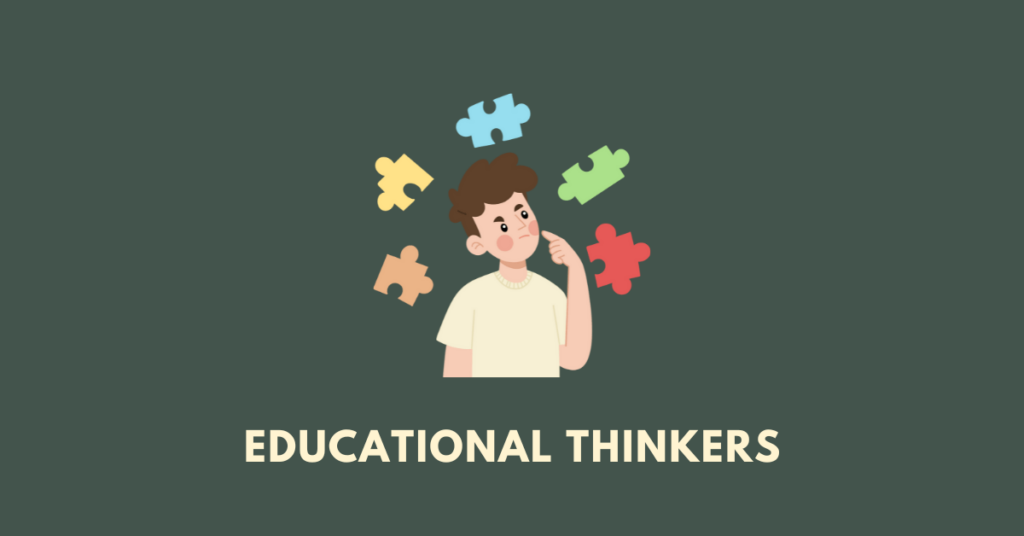Educational Thinkers: Shaping the Landscape of Learning

Introduction
Throughout history, educational thinkers have played a pivotal role in shaping how we perceive, practice, and reform education. Their philosophies, theories, and innovations have not only transformed teaching methodologies but have also influenced societal structures, policy-making, and the very essence of what we consider education. This article explores some of the most influential figures in educational thought, whose ideas continue to resonate in classrooms around the world.
1. Socrates (469–399 BCE)
- Philosophy: Often credited as the father of Western philosophy, Socrates is known for the Socratic method—a form of inquiry and discussion intended to stimulate critical thinking and to illuminate ideas.
- Impact: His method of questioning everything has influenced educational practices by emphasizing dialogue, critical thinking, and the pursuit of truth over mere memorization.
2. Plato (427–347 BCE)
- Philosophy: Plato expanded on Socrates' ideas, focusing on the education of the whole person. His "Republic" discusses the ideal state where education is central, advocating for a curriculum that includes physical, intellectual, and moral development.
- Impact: His Academy in Athens is one of the earliest known institutions of higher learning, laying the groundwork for formal education systems.
3. Confucius (551–479 BCE)
- Philosophy: Confucius emphasized moral education, respect for hierarchy, and the cultivation of virtues like benevolence, righteousness, and propriety through learning.
- Impact: His teachings form the basis of Confucian education, which has shaped East Asian educational systems, focusing on moral and ethical development alongside academic learning.
4. Jean-Jacques Rousseau (1712–1778)
- Philosophy: Rousseau argued for "natural education" in "Emile," where children should learn from nature, experience, and their own inclinations rather than rigid curricula.
- Impact: His ideas influenced progressive education movements, emphasizing child-centered learning, freedom, and the importance of play in education.
5. Johann Heinrich Pestalozzi (1746–1827)
- Philosophy: Pestalozzi believed in education through the senses, promoting a holistic approach that integrates head, heart, and hands. He advocated for education that respects the child's individuality.
- Impact: His methods laid the foundation for modern elementary education, particularly in the development of teacher training and inclusive education for all social classes.
6. Friedrich Froebel (1782–1852)
- Philosophy: Known as the "Father of Kindergarten," Froebel focused on early childhood education, believing that play was the highest form of learning for young children.
- Impact: His "kindergarten" concept has become a universal standard for early education, emphasizing creativity, play, and the development of the whole child.
7. John Dewey (1859–1952)
- Philosophy: Dewey's pragmatism led to the progressive education movement, where education is seen as a preparation for democratic life, emphasizing learning by doing, problem-solving, and critical thinking.
- Impact: His ideas have shaped modern educational practices, particularly in the U.S., promoting experiential learning and student engagement.
8. Maria Montessori (1870–1952)
- Philosophy: Montessori's method focuses on self-directed activity, hands-on learning, and collaborative play in mixed-age classrooms, tailored to the child's developmental stage.
- Impact: Her educational approach has led to the establishment of Montessori schools worldwide, emphasizing independence, freedom within limits, and respect for a child's natural psychological development.
9. Paulo Freire (1921–1997)
- Philosophy: Freire's "Pedagogy of the Oppressed" introduced the concept of critical pedagogy, advocating for education as a practice of freedom, where students and teachers learn from each other in a dialogical relationship.
- Impact: His work has significantly influenced adult education, especially in the context of liberation, social justice, and empowerment of marginalized communities.
10. Lev Vygotsky (1896–1934)
- Philosophy: Vygotsky emphasized the social nature of learning, introducing concepts like the Zone of Proximal Development and scaffolding, where learning occurs through social interaction.
- Impact: His theories have deeply influenced educational psychology, particularly in understanding how culture affects cognitive development and in promoting collaborative learning environments.
Contemporary Thinkers
1. Howard Gardner (1943 - )
- Philosophy: Introduced the theory of Multiple Intelligences, suggesting that intelligence is not a single, general ability but a range of different abilities including linguistic, logical-mathematical, spatial, musical, bodily-kinesthetic, interpersonal, intrapersonal, and naturalistic intelligences.
- Impact: This theory has influenced educational practices by advocating for diverse teaching methods that cater to different learning styles, fostering a more inclusive educational environment.
2. Ken Robinson (1950 - 2020)
- Philosophy: A strong advocate for creativity in education, Robinson argued that schools often kill creativity through standardized teaching and testing. His work emphasizes the need for an education system that nurtures creativity, imagination, and personal talents.
- Impact: His TED Talk, "Do Schools Kill Creativity?", has one of the highest view counts, influencing educators to rethink curriculum design and teaching methods to incorporate arts and creativity.
3. Sugata Mitra (1952 - )
- Philosophy: Known for his "Hole in the Wall" experiment, where children in rural India taught themselves computer literacy, Mitra advocates for self-organized learning environments (SOLE). His work suggests that children can learn effectively when given access to the internet and encouraged to explore in groups.
- Impact: His ideas have inspired a shift towards more autonomous, curiosity-driven learning, leading to experiments in educational technology and pedagogy worldwide.
4. Linda Darling-Hammond (1951 - )
- Philosophy: Darling-Hammond focuses on educational equity, teacher preparation, and policy. She advocates for high-quality teaching practices, professional development, and the integration of assessment with learning.
- Impact: Her work has significantly influenced teacher education reform and policy in the United States, promoting teaching as a profession with rigorous standards and continual learning.
5. Carol Dweck (1946 - )
- Philosophy: Dweck's theory of mindset differentiates between a "fixed mindset" where abilities are static, and a "growth mindset," where abilities can be developed through dedication and hard work. This has implications for how praise and feedback are given in education.
- Impact: Her research has led to changes in teaching practices, emphasizing effort over innate talent, which has helped in fostering resilience and a love of learning in students.
6. Salman Khan (1976 - )
- Philosophy: Through Khan Academy, Khan promotes the idea of personalized, self-paced learning using technology. His approach democratizes education by making high-quality educational content freely available.
- Impact: Khan Academy has reshaped views on education delivery, emphasizing mastery learning where students can progress based on their understanding rather than traditional class schedules.
7. Yong Zhao (1965 - )
- Philosophy: An advocate for global education, Zhao criticizes standardized testing and the one-size-fits-all approach to education. Instead, he promotes entrepreneurship, creativity, and the importance of nurturing individual talents over uniform educational outcomes.
- Impact: His work encourages educational systems to value diversity in student learning paths, influencing educational policy and practice towards more personalized and culturally responsive education.
Conclusion
These educational thinkers have left an indelible mark on how education is conceptualized and conducted around the globe. Their philosophies range from the individualistic to the collective, from the naturalistic to the structured, but all share a common goal: to foster learning environments that nurture not just intellectual growth but also moral, social, and personal development. As education continues to evolve with technological and societal changes, the foundational ideas from these thinkers remain relevant, guiding educators to adapt and innovate while keeping the learner at the heart of educational practice. Their legacy continues to challenge us to think critically about education's purpose and its potential to transform lives and societies.
